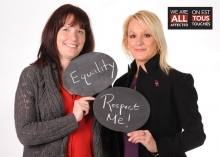The ongoing fight for pay equity in Canada

Nevertheless, the attacks that Canadian workers face in the exercise of their collective bargaining rights are threatening to undermine the achievements made.
This year, Public Service Alliance of Canada (PSAC) submitted comments on the implementation of ILO Convention 100 to the Committee of Experts on the Application of Conventions and Recommendations, as it applies to the federal government of Canada. This is one example of using ILO’s Supervisory Mechanism to pressure governments and increase international pressure for the defense of collective bargaining and equality at work.
In Canada, pay equity has been a human right since 1977, protected in the Canadian Charter of Rights and Freedoms. Despite this protection, the fight to secure and enforce pay equity remains an ongoing battle for Canadian women and their unions. PSAC has been at the forefront of this fight since 1977 and remains so today.
However, recent issues of concern to the trade union movement include:
- The Public Sector Equitable Compensation Act, which restricts the substance and the application of pay equity in the federal public service.
- Delayed justice: winning one pay equity complaint is not enough. The fight has included many long battles to ensure that the achieved settlements are actioned in full.
- Proactive pay equity legislation is needed to cover women as well as racially visible workers, aboriginal workers and workers with disabilities. It must include all workers whether they work full or part-time, temporary or casual.
- Barriers to pay equity: employer organisations have mounted a powerful lobby to delay the introduction of equality-enhancing legislation. Employer intransigence is a barrier to achieving pay equity in Canada, through legislation or through collective bargaining
- Bargaining imperiled: PSAC’s ability to negotiate positive changes through collective bargaining has been impeded by federal government legislation. In October 2013, Bill C-4 changed the process for resolution of disputes in negotiating collective agreements, grievance and grievance adjudication. These changes have made a profound impact upon the ability of federal unions to bargain effectively.
Canadian trade unions continue to fight for pay equity in face of these hurdles.

